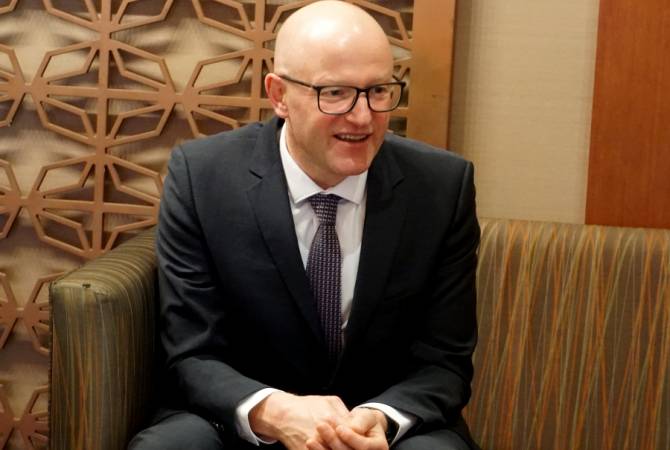Recently Deputy Director of Cambridge Assessment International Education Dan Bray was in Armenia. During the visit, Armenpress interviewed Mr. Bray on the fate of the Araratian Baccalaureate, global education trends and prospects for further collaboration with the Ayb Foundation.
- Mr. Bray, today there are various discussions over the Araratian Baccalaureate and its international recognition and so, could you briefly say why the international recognition of a qualification is important.
There are really two reasons why international recognition is important. The first and, I think, the most important reason is that it’s a guarantee of quality, which is so important for lots of people — for parents,for teachers, for schools, for students themselves. It’s a reassurance that the qualification is at least of the same standard and of the same quality as you would receive anywhere else in the world. The second reason refers to value. What the international recognition does, it demonstrates the value of the certificate, and that might be to universities, whether they be in Armenia or abroad, or might be to employers, or to anybody who is interested in the value of certificate. So the international recognition is a way of demonstrating to the world the quality and value of a qualification and its certificate.
This particular project, the Araratian Baccalaureate, has a number of design aspects that are, I think, very cleverly done, and there has been a very clear vision of what the Ayb Foundation was trying to achieve with the program, and we have not deviated from that goal and we kept the project lean and efficient, which has allowed it to a) do it very quickly and b) to do it cost effectively, but still not compromise on the quality, and achieve high value.
- Who is the Araratian Baccalaureate for?
All successful education systems need multiple options to suit different types of students; students with different interests, students with different abilities. Because of its quality and careful design I believe the AB represents what could be a really valuable option for some of those students in Armenia that want to study the more rigorous academic path. All education systems need variations of certificates awarded to students and AB could be one the most powerful beacons of excellence for the population in Armenia.
- The Araratian Baccalaureate was benchmarked against Cambridge International A Levels. Why?
That was a standard that we chose for a number of reasons. The first is that it’s a well-recognized international standard, and the world of education understands the level of education it offers. The second reason why the A Levels was appropriate was that the A Levels have been created to be flexible, so they represent a set of outcomes for students. So the AB was benchmarked against the A Levels to understand the levels it is achieving.
- Given the uncertainty over the Araratian Baccalaureate, will there be other prospects for further collaboration with the Ayb Educational Foundation?
The prospects are already there and we are excited to continue collaborating with the Ayb Educational Foundation. One area that we are looking to explore together is the sophisticated use of data to support students and teachers in the classroom. The world of data analytics and computing is changing very rapidly. Тhere are advances in machine learning, and artificial intelligence and there's no reason to think it will stop. Importantly, the world of education understands what power we can generate from that data and how that can support teachers in the classroom and the Ayb Foundation has ideas of how that might work. And we will collaborate and work together to understand how to implement it. It’s not about trying to replace teachers with computers, it’s about understanding what teachers do well that computers can’t do, and free them perhaps from the more mechanical elements of the job by training sophisticated computer programs to do it, to free time from teachers so they have more time to focus on their teaching and students’ learning. And we certainly are able to build products and services that will be beneficial for schools of today and of the future. This is a priority for both Cambridge Assessment and the Ayb Foundation and it’s a priority for both organizations that we can find ways in which we can combine skills and resources to explore the area further.
- Does it mean that the traditional classroom will go online?
The key thing is to learn how computers can support teachers in the classroom and not think of how they can replace them. There are things that school does other than just instruction. Part of the reason you go to school is to learn about social interaction, and how to operate in groups, teams, etc., and that is very difficult to replicate online. In this regard, I can’t see that in my lifetime in the primary model of education we will arrive in a situation where we won’t have classrooms in schools. However, classrooms themselves will be very different from where they are now; they will have more project-based learning, more individualized learning, we will have teachers that will be facilitating the learning process in different ways, etc.
- Will the result of the new area of collaboration be available for schools in Armenia?
Together with the Ayb Educational Foundation, we’ve always been thinking about designing things that could be taken out to the country nationally. And that is the Ayb Foundation’s vision. That was the vision that they articulated to Cambridge Assessment when we started working on the Araratian Baccalaureate. Together we build systems that will support the national curriculum and we are eager to roll them out and make available for schools in Armenia, but it’s really up to authorities and policy makers in Armenia whether it rolls out to all schools or a set of schools or doesn’t roll out at all.
